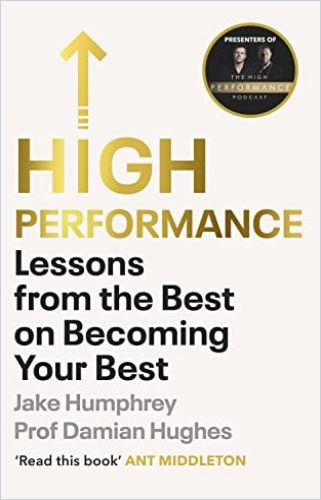High Performance podcast hosts Jake Humphrey and Damian Hughes draw potent insights from their conversations with more than 150 world-famous high achievers. The bottom line: You can become a high performer, too.

Lessons from Legends
As co-hosts of the High Performance podcast, English sports presenter Jake Humphrey and organizational psychology consultant Damian Hughes have interviewed more than 150 world-famous high achievers in a wide variety of fields. They’ve spoken, for example, with sprinters Kelly Holmes and Dina Asher-Smith, rugby player Jonny Wilkinson, coaches, including the South African rugby skipper Siya Kolisi and Liverpool captain Steven Gerrard, renowned businesspeople, such as Holly Tucker and Steve Morgan, and performers like Hollywood star Matthew McConaughey and ballet dancer Marcelino Sambé.
High Performance, the book, distills these fascinating, wide-ranging conversations into eight fundamental lessons. Given the rich vein of material available to them, Hughes and Humphrey offer advice by the handful. Much of it, naturally, echoes other success and leadership titles; but given the comprehensiveness of the text’s content – and the truly fresh nature of a number of its ideas – High Performance earns its place on the bookshelf of any person who aspires to high achievement.
Own Your Life
Hughes and Humphrey organize the book into three sections covering the three steps to high performance: high-performance mind-set, behavior and teams. They liken these domains to concentric circles: Mind-set forms the core, behavior radiates from it, and teams follow from attitudes and behavior.
Mind-set comes first, Humphrey and Hughes insist. Top achievers enable their own high performance by adopting a specific mind-set – one that many people have yet to learn: self-responsibility. Like everybody else, high performers face adversity in their lives, Hughes and Humphrey point out. Yet instead of blaming the weather, the system or other people when life throws them a curveball, top achievers take full responsibility and focus on their responses to these challenges.
High performance ripples outward from our minds, to our actions to our teams.Jake Humphrey and Damian Hughes
High performers also have an unshakeable belief that they can solve problems – and as a result, they often do. They possess the quality psychologist Albert Bandura calls self-efficacy: seeing themselves as capable of tackling any unexpected obstacle.
Push Yourself
Hughes and Humphrey emphasize that high performers find their motivation within. External rewards, such as money, status or the approval of others, can provide motivation in the short term, they say; but external motivation quickly loses its efficacy. High performers rely on internal motivation. But internal motivation doesn’t come naturally to high achievers. The people Humphrey and Hughes interviewed had to work hard for it, building and nurturing their own motivation.
Learn to Cope with Pressure
Hughes and Humphrey also delve into high performers’ ability to manage their own emotions, particularly in high-pressure situations. Top achievers avoid responding impulsively or panicking in challenging moments; instead, they cultivate the capacity to remain logical, rational and calm.
No one can control what happens to them, but everyone can control their response.Jake Humphrey and Damian Hughes
The authors often cite science to support the insights they discuss. Psychiatrist Ceri Evans, they note, proposes a distinction between the rational, compassionate “blue brain” and the impulsive, panic-prone “red brain.” High performers learn to tame the red brain and keep the blue brain in control by focusing on facts, maintaining perspective and reminding themselves of their strengths.
Be Consistent
High performers exercise consistency in nonnegotiable – or “trademark” – behaviors that they set for themselves and their teams, Humphrey and Hughes say. Such trademark behaviors can include, for example, a commitment to arriving early for every appointment.
Success is…only 20% talent.Olympic sprinter Kelly Holmes
When choosing your nonnegotiables, ensure they’re simple and clear, and that they’ll count under pressure, Humphrey and Hughes advise. Repeat each trademark behavior until it becomes an automatic habit. When your nonnegotiables become a part of who you are, Humphrey and Hughes promise, you’ll start to see yourself as a high performer no matter what challenges life presents.
Develop Yourself
Hughes and Humphrey describe a slate of personal qualities that high performers cultivate in themselves and then rely on to support their achievement. Often, the authors point out, people’s strengths remain hidden, particularly when their skills don’t fit a certain school system or meet certain workplace requirements. Intelligence expresses itself in numerous ways; in order to become a high performer, you’ll have to discover your own superpowers.
Stop fixating on what you’re bad at. All that matters is what you’re great at. Find it, and run at it.Jake Humphrey and Damian Hughes
To find your strengths, Hughes and Humphrey advise investigating the clues that your special talents leave. They recommend thinking about times when other people noted a special skill or natural advantage you possess, and reflecting on activities in which you excel, those you enjoy doing and those that put you in a state of flow.
Build a Team
Humphrey and Hughes point out that moderately talented people who have good teamwork skills will outperform solo star players or even a group of great performers who can’t work together well. To build a high-performing team, they say, first identify a big, audacious goal that will inspire the whole team to move as one in a certain direction. Then define the nonnegotiable behaviors that will enable the team to achieve this goal.
Nobody wants to be a high performer alone. In fact, nobody can be a high performer alone. Jake Humphrey and Damian Hughes
Humphrey and Hughes outline the characteristics of high performers acting as team leaders. These include modeling the behaviors they desire their team to adopt, and granting their people autonomy and discretion in how to move toward team goals. High performers practice honesty with themselves and their people. They admit their weaknesses, the authors say, and concentrate on doing what they do well, delegating the rest to the team. They nurture a safe, trusting team culture.
Be Brave
People often overlook the crucial role that courage plays in high performance, Humphrey and Hughes say. The authors define courage as feeling your fear – not avoiding it – and doing the things you want to do anyway. Helpful hacks for developing courage include believing in yourself, reminding yourself how far you’ve come, asking for help from people you trust, and celebrating failure as the best and fastest way to learn.
True courage…is about looking failure in the eye and pushing through it. It’s about knowing that failure isn’t something to be afraid of.Jake Humphrey and Damian Hughes
The overall take-away: All top achievers share certain traits and behaviors – but none of them was born a high performer. Humphrey and Hughes show how these men and women turned themselves into top achievers by consciously developing a high-performing mind-set, adopting certain behaviors and building teams to support their efforts. Hughes and Humphrey insist you can do the same.





